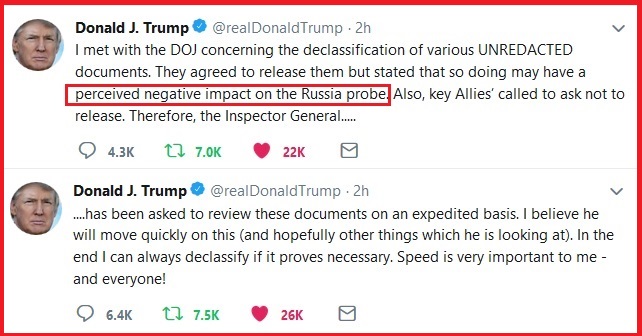DOJ suppressed evidence that showed Mueller had no case
In the spring and summer of 2018 everyone became aware of the DOJ and FBI collective effort to target President Trump under the false guise of a Trump-Russia collusion claim.
It must have been extremely frustrating for a sitting president to know there was nothing to the claims yet be constantly bombarded by media and political people in Washington DC who held a vested interest in maintaining them.
By the time we get to September of 2018 the basic outline of the FBI use of the Trump-Russia targeting operation were clear. However, the Robert Mueller investigation was at its apex, and anyone in/around Donald Trump was under investigation for ancillary issues that had nothing to do with Russia.
It was into this fray of constant false narratives that President Trump first made statements that he would declassify documents related to his targeting. It was after Trump made those statements when the real motives of putting Robert Mueller as a special counsel became clear.
With Attorney General Jeff Sessions recused from anything to do with the Trump-Russia investigation, it was Deputy Attorney General Rod Rosenstein who delivered the message to President Trump in September of 2018, shortly before the midterm election, that any action by him to release documents, now under the purview of the Mueller special counsel, would be considered an act of “obstruction” by the DOJ/FBI people charged with investigating him.
Immediately after meeting with Rod Rosenstein, Trump tweeted:
This was the first act of betrayal by political operatives within Main Justice who did not recognize or accept the concept of the ‘unilateral executive.’ According to Rod Rosenstein, FBI Director James Comey, Deputy FBI Director Andrew McCabe, and even later (including recently) AG Bill Barr, the office of the president cannot exercise unilateral executive authority when he himself is the subject of their investigative power.
In essence the DOJ and FBI, along with white house counsel and a collaborating senate and media, kept President Trump from declassifying and releasing documents by threatening him with impeachment and/or prosecution if he defied their authority. The threats created a useful Sword of Damocles, and blocked Trump from acting to make documents public.
In the months that followed President Trump frequently made public statements and tweets about the frustration of documents not being declassified and released despite his instructions to do so. Many Trump supporters also began expressing frustration.
The external debate and consternation surrounded how the Administrative State has seemingly boxed-in President Trump through the use of the Mueller/Weissman counterintelligence probe, authorized by Rod Rosenstein, where President Trump was the target of the investigation.
A widely held supporter perspective was that President Trump could expose the fraudulent origination of the counterintelligence investigation; of which he is now a target; if he were to declassify a series of documents as requested by congress and allies of his administration. This approach would hopefully remove the sword of Damocles.
The core issue within the debate surrounded two contradictory reference points: (1) President Trump has ultimate declassification authority. Yes; however, in this example President Trump is also the target of the investigation; so, (2) declassification could be viewed by elements within the investigation as ‘obstruction’. Both of these points were true.
Also true was the reality that both laws and politics were in play.
...
The Mueller investigation was based on a fraud perpetrated by Trump's political enemies and the government established collaborated to prevent Trump from demonstrating his innocence by suppressing the release of documents. Both the Muller probe and the response by the bureaucracy were illicit attempts to overthrow an election based on a fraud. It is the same thing that happened near the end of his presidency.

Comments
Post a Comment